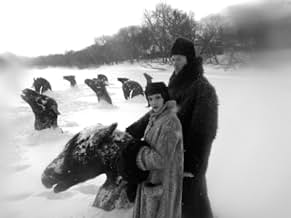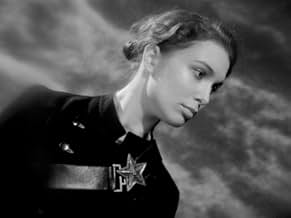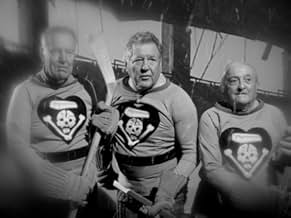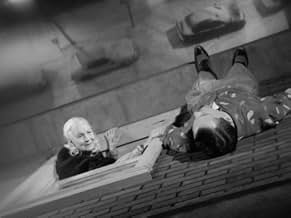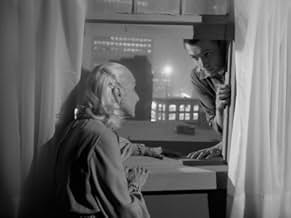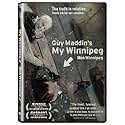IMDb-BEWERTUNG
7,5/10
5863
IHRE BEWERTUNG
Füge eine Handlung in deiner Sprache hinzuFact, fantasy and memory are woven seamlessly together in this portrait of film-maker Guy Maddin's home town of Winnipeg, Manitoba.Fact, fantasy and memory are woven seamlessly together in this portrait of film-maker Guy Maddin's home town of Winnipeg, Manitoba.Fact, fantasy and memory are woven seamlessly together in this portrait of film-maker Guy Maddin's home town of Winnipeg, Manitoba.
- Auszeichnungen
- 4 Gewinne & 17 Nominierungen insgesamt
Empfohlene Bewertungen
Guy Maddin described My Winnipeg as 'docutasia' and that's probably more accurate than any other description I could give of it. The film is a very personal, light-hearted, but informative, look at Winnipeg through the eyes of her native son Guy Maddin. The film is shot in black and white, combining stock archival footage (including private home videos) with some new freshly shot material. The film follows a young Guy Maddin (played by Darcy Fehr) on a train trying to escape from 'sleepy, snowing, Winnipeg' and its mystic pull. To affect his escape Maddin must, through the course of the film, come to terms with everything that binds him to the city (family, home, community, and history). Held together by the barest narrative thread, the film is most like Berlin: Symphony of a Great City, though being Canadian it's much funnier and self-deprecating. The film is narrated by Guy Maddin himself, and despite the fact that he seemed to have many reservations about using his own voice, he does a great job (ranging from the fiery sermon of charged propagandist to the soft relaxing repetition of an experienced hypnotist). Made for the documentary channel, with a TV audience in mind, the film is accessible enough for anyone and funny enough to make even Winnipeg charming. While I don't know if it's feature film material, definitely watch if you can catch it on the tube.
God bless Guy Maddin. There is nobody else like him. He takes material from the cinematic past and reshapes it in his own completely unique way. He does all this from his own studio in the artistic backwater of Winnipeg. The results are funny, poignant, absurd, and magical. In this he draws on memories of his childhood, family, and community.
Winnipeg is to Guy Maddin as Baltimore is to John Waters. It's very unfashionability is its inspiration. But where Waters dwells on hairspray and bouffant dresses and twisted vowels, Maddin describes Winnipeg as a place of perpetual snow, destroyed hockey rinks, and sleepwalkers. "Winnipeg, Winnipeg, Winnipeg, Winnipeg...." he begins his incessant voice-over as the first of his typically distressed, nostalgic black and white images in square format appear showing long-ago men and women walking in snow-covered streets and a man dozing in a train car whose big window is like a movie screen showing figures and the big face of his mother. Sometimes blurry phrases flicker onto the screen echoing his words, like a refrain.
The man (Darcy Fehr) is meant to be himself, getting out of town. "I've got to leave it, I've got to leave it," he chants, and then speculates that maybe he can film his way out of Winnipeg, putting all his past on celluloid and thereby ridding himself of its fascination so he can move elsewhere.
For this poem and rant about his native city, which he says he wants to leave and can't, Maddin hired actors to play his mother and some of his siblings and borrowed his girlfriend's pug to stand in for the childhood chihuahua. He leased their old house and moved the old furniture (or facsimiles) into it, distributing a runner carpet and shabby couches in the living room and an old TV. His mother is played by veteran B-picture vixen Ann Savage. Black and white images of what purports to be his real family back in the Fifties flash on the screen alternating with their hired look-alikes as Maddin spins arcane anecdotes about his childhood and drops in the occasional fact. An old department store and a restaurant that served orange jello figure prominently, as does the dynamiting of a treasured tree and a hockey arena. If there is a logic to this quirky ramble, it's as sui generis as you can get.
We don't come away with a sense of Maddin's actual past, because all his anecdotes seem highly embroidered, like his mother's grabbing some friends' 75-year-old myna bird--which ran free in the house and had "a large vocabulary"--and smashing it to the floor because she was afraid of birds. Or the family threatening their mother with a parakeet to make her get out of bed and cook them a meatloaf. Or the team of ancient hockey stars, all suited up, one known to be dead his face all covered in bandages, playing in a half-destroyed arena, while Maddin sings their praises and curses the establishment of the NHL, which he regards as the beginning of the end. He says his father was a hockey executive, and he grew up in the locker room--was even born in the dressing room of the Winnipeg Maroons. According to him, Winnipeg has a secret network of back streets that parallels the main ones, and to pacify two rival taxi companies one was allowed to ride only on the main streets and the other only on the back alleys, where the ride over the snow is cushiony. The city he invents has an annual "If Day" when the town is invaded by mock Nazis who rename it "Himmlerstadt." A racetrack fire disaster caused a dozen horses to become buried in the earth with just their giant heads out of the snow in attitudes of agony. People come later to visit and picnic. In the family living room they watch a show called "Ledge Man" every day (it's run "for fifty years") in every episode of which the actress playing Maddin's mother talks the actor playing Maddin out of jumping from a ledge to his death.
Maddin calls this film, done for the "Documentary Channel," a "docu-fantasia," and that's what it is--sort of. It's hard to pin a genre to his film-making and this one is also an imaginary autobiography. He depicts himself living in an insular snow-globe parallel universe (sometimes fake slant lines of white snow are superimposed on scenes)--like the parallel system of back streets. The voice-over is a kind of crotchety incantation; Maddin has said this could be called "A Self-Destructive Sulk." What entertains, in its fey and offbeat way, is the man's humorous detachment; what appeals is the sense of a cozy far-off snowed-in world whose present is so remote it's like its past, a town that isn't very old but seems as if it is. For all the detail about growing up in a hairdressing establishment, lying in the living room with the family watching TV, being trapped in an indoor swimming pool complex on three levels among naked boys with "hairless boners" who refuse to swim, there's no sense of personal revelation at all, any more than in Dylan Thomas' "A Child's Christmas in Wales." And in his interweaving of the invented and the real, the contemporary and the archival in flickering dreamlike images, this movie has the power to enchant.
But also to numb. If Winnipeggers are sleepwalkers, the viewers of 'My Winnipeg' may at moments become sleep-sitters. And yet for a filmmaker so obviously withdrawn and secretive, this is his most autobiographical and perhaps most accessible and appealing work so far. "Amusing, elegant, inconsequential and it doesn't overstay its limited welcome," a London critic writes. I guess that's fair.
The man (Darcy Fehr) is meant to be himself, getting out of town. "I've got to leave it, I've got to leave it," he chants, and then speculates that maybe he can film his way out of Winnipeg, putting all his past on celluloid and thereby ridding himself of its fascination so he can move elsewhere.
For this poem and rant about his native city, which he says he wants to leave and can't, Maddin hired actors to play his mother and some of his siblings and borrowed his girlfriend's pug to stand in for the childhood chihuahua. He leased their old house and moved the old furniture (or facsimiles) into it, distributing a runner carpet and shabby couches in the living room and an old TV. His mother is played by veteran B-picture vixen Ann Savage. Black and white images of what purports to be his real family back in the Fifties flash on the screen alternating with their hired look-alikes as Maddin spins arcane anecdotes about his childhood and drops in the occasional fact. An old department store and a restaurant that served orange jello figure prominently, as does the dynamiting of a treasured tree and a hockey arena. If there is a logic to this quirky ramble, it's as sui generis as you can get.
We don't come away with a sense of Maddin's actual past, because all his anecdotes seem highly embroidered, like his mother's grabbing some friends' 75-year-old myna bird--which ran free in the house and had "a large vocabulary"--and smashing it to the floor because she was afraid of birds. Or the family threatening their mother with a parakeet to make her get out of bed and cook them a meatloaf. Or the team of ancient hockey stars, all suited up, one known to be dead his face all covered in bandages, playing in a half-destroyed arena, while Maddin sings their praises and curses the establishment of the NHL, which he regards as the beginning of the end. He says his father was a hockey executive, and he grew up in the locker room--was even born in the dressing room of the Winnipeg Maroons. According to him, Winnipeg has a secret network of back streets that parallels the main ones, and to pacify two rival taxi companies one was allowed to ride only on the main streets and the other only on the back alleys, where the ride over the snow is cushiony. The city he invents has an annual "If Day" when the town is invaded by mock Nazis who rename it "Himmlerstadt." A racetrack fire disaster caused a dozen horses to become buried in the earth with just their giant heads out of the snow in attitudes of agony. People come later to visit and picnic. In the family living room they watch a show called "Ledge Man" every day (it's run "for fifty years") in every episode of which the actress playing Maddin's mother talks the actor playing Maddin out of jumping from a ledge to his death.
Maddin calls this film, done for the "Documentary Channel," a "docu-fantasia," and that's what it is--sort of. It's hard to pin a genre to his film-making and this one is also an imaginary autobiography. He depicts himself living in an insular snow-globe parallel universe (sometimes fake slant lines of white snow are superimposed on scenes)--like the parallel system of back streets. The voice-over is a kind of crotchety incantation; Maddin has said this could be called "A Self-Destructive Sulk." What entertains, in its fey and offbeat way, is the man's humorous detachment; what appeals is the sense of a cozy far-off snowed-in world whose present is so remote it's like its past, a town that isn't very old but seems as if it is. For all the detail about growing up in a hairdressing establishment, lying in the living room with the family watching TV, being trapped in an indoor swimming pool complex on three levels among naked boys with "hairless boners" who refuse to swim, there's no sense of personal revelation at all, any more than in Dylan Thomas' "A Child's Christmas in Wales." And in his interweaving of the invented and the real, the contemporary and the archival in flickering dreamlike images, this movie has the power to enchant.
But also to numb. If Winnipeggers are sleepwalkers, the viewers of 'My Winnipeg' may at moments become sleep-sitters. And yet for a filmmaker so obviously withdrawn and secretive, this is his most autobiographical and perhaps most accessible and appealing work so far. "Amusing, elegant, inconsequential and it doesn't overstay its limited welcome," a London critic writes. I guess that's fair.
A love poem to Canadian auteur Guy Maddin's soon-to-be-former home, MY WINNIPEG feels like a fever dream that brings together past, present, and future. Repeated words and phrases form a hypnotic cadence as Maddin's cinematic stand-in (Darcy Fehr) chugs through the snowy darkness. "Winnipeg, Winnipeg, Winnipeg," is the chant, rising and falling like the locomotive drone of the night train carrying its somnambulistic fares through Manitoba's premiere city.
Winnipeg; heart of the heart of Canada, the place that raised Maddin. With a hockey arena for a father and a hair salon for a mother (for more hockey and hairdressing see Maddin's earlier COWARD BENDS THE KNEE), Madding explores the structural arteries of his home town and revisits the history of himself and his city. Narrated by the filmmaker, the prose of the film (courtesy of long-time Maddin crony George Toles) is an overwrought poem of maniacal hyperbole and enthusiastic linguistic gymnastics; a perfect pitch for the fractured visuals of Maddin's multimedia pastiche. Looking like a daguerreotype picture postcard of this snowbound wonderland, MY WINNIPEG typifies Maddin's mad genius and captures his sordid relationship with his home.
Winnipeg; heart of the heart of Canada, the place that raised Maddin. With a hockey arena for a father and a hair salon for a mother (for more hockey and hairdressing see Maddin's earlier COWARD BENDS THE KNEE), Madding explores the structural arteries of his home town and revisits the history of himself and his city. Narrated by the filmmaker, the prose of the film (courtesy of long-time Maddin crony George Toles) is an overwrought poem of maniacal hyperbole and enthusiastic linguistic gymnastics; a perfect pitch for the fractured visuals of Maddin's multimedia pastiche. Looking like a daguerreotype picture postcard of this snowbound wonderland, MY WINNIPEG typifies Maddin's mad genius and captures his sordid relationship with his home.
It's so hard to write about a Guy Maddin film. What exactly do I describe, what do I say about the film? His films defy convention in every way imaginable. I can guarantee that there is no film out there that's even especially similar to "My Winnipeg" in style or content, even if Maddin's current style is essentially a pastiche of a particular sort of silent film, there are none that are edited in the same way or used to quite the same effect as Maddin's films are. At least none that I have seen, as Maddin is not imitating anyone, but making films in a style that is not used anymore, and had he been making films in the 1920's he might have been considered an innovator. "My Winnipeg" is a film I wish I was clever enough to make about any of the cities I've lived in and fallen in love with, and is original enough to captivating, but is also astonishingly clever and witty and funny and entertaining.
I was actually not a big fan of Maddin's last film, "Brand Upon the Brain!", a pleasant enough film but ultimately of no real worth or substance, merely a visually interesting retread of themes Maddin fans are familiar with. It was certainly a far cry from some of his better work- "Archangel" and "Careful" being my favorites. Maddin is certainly one of my favorite Canadian directors, and one of our few genuine auteurs whose work is actually accessible and available relatively easily, but there's always been an issue with his films, even his better work, the issue being that his films often feel rather insubstantial. Like the bizarre and amusing experiments of an eccentric than anything of real value (although obviously that is debatable). I always enjoy a Guy Maddin film, but I think "My Winnipeg" is the first of his which struck me as truly passionate or exceptional with regard to its content.
"My Winnipeg" tells you everything you need to know about it in the title. This is Guy Maddin's love/hate letter to his home town of Winnipeg, Manitoba, and it's really about HIS Winnipeg, and it's the sort of personal thing that could have so easily been a bore, but Guy Maddin is so interesting that his own perception of Winnipeg is enough to sustain this 80 minute film. It flies by, leaving the viewer in an appreciative daze by the end, appreciative of the remarkable sense of humor in the film, the wit, the cleverness of the narrative, and a real sense of Maddin's love and passion for Winnipeg. This film has everything that is appealing about Maddin's work as well as a new richness that he'd never quite found before. It's an oddly inspiring film, gorgeous to look at and rather unexpectedly the funniest film I've seen from 2008 as well.
I was actually not a big fan of Maddin's last film, "Brand Upon the Brain!", a pleasant enough film but ultimately of no real worth or substance, merely a visually interesting retread of themes Maddin fans are familiar with. It was certainly a far cry from some of his better work- "Archangel" and "Careful" being my favorites. Maddin is certainly one of my favorite Canadian directors, and one of our few genuine auteurs whose work is actually accessible and available relatively easily, but there's always been an issue with his films, even his better work, the issue being that his films often feel rather insubstantial. Like the bizarre and amusing experiments of an eccentric than anything of real value (although obviously that is debatable). I always enjoy a Guy Maddin film, but I think "My Winnipeg" is the first of his which struck me as truly passionate or exceptional with regard to its content.
"My Winnipeg" tells you everything you need to know about it in the title. This is Guy Maddin's love/hate letter to his home town of Winnipeg, Manitoba, and it's really about HIS Winnipeg, and it's the sort of personal thing that could have so easily been a bore, but Guy Maddin is so interesting that his own perception of Winnipeg is enough to sustain this 80 minute film. It flies by, leaving the viewer in an appreciative daze by the end, appreciative of the remarkable sense of humor in the film, the wit, the cleverness of the narrative, and a real sense of Maddin's love and passion for Winnipeg. This film has everything that is appealing about Maddin's work as well as a new richness that he'd never quite found before. It's an oddly inspiring film, gorgeous to look at and rather unexpectedly the funniest film I've seen from 2008 as well.
Wusstest du schon
- WissenswertesDirector Guy Maddin provided live narration at many film festival screenings.
- Crazy CreditsTapioca Wrangler - Marnie Patuck
- VerbindungenFeatured in My Winnipeg: Live in Toronto (2008)
- SoundtracksWonderful Winnipeg
Written by Leon Naleway
Performed by The Swinging Strings (vocal by Jim Wheeler)
Courtesy Shawn Nagy
Played during the opening credits
Top-Auswahl
Melde dich zum Bewerten an und greife auf die Watchlist für personalisierte Empfehlungen zu.
- How long is My Winnipeg?Powered by Alexa
Details
- Erscheinungsdatum
- Herkunftsland
- Offizielle Standorte
- Sprache
- Auch bekannt als
- 나의 위니펙
- Drehorte
- Produktionsfirmen
- Weitere beteiligte Unternehmen bei IMDbPro anzeigen
Box Office
- Budget
- 600.000 $ (geschätzt)
- Bruttoertrag in den USA und Kanada
- 159.363 $
- Eröffnungswochenende in den USA und in Kanada
- 14.309 $
- 15. Juni 2008
- Weltweiter Bruttoertrag
- 316.743 $
- Laufzeit1 Stunde 20 Minuten
- Farbe
- Sound-Mix
- Seitenverhältnis
- 1.33 : 1
Zu dieser Seite beitragen
Bearbeitung vorschlagen oder fehlenden Inhalt hinzufügen








